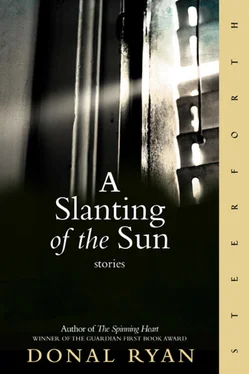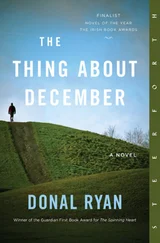They’d come to the court to root for him and to jostle and swear in the foyer and profess their love for him and decry the terrible injustice that was being done and slag was said and lying bitch and one of them got wicked shirty and was dragged away kicking to a paddy-wagon and a cat was set among the pigeons then and a skirmish threatened to expand fully into battle and we formed a circle of decent men around John P and his wife and daughter and the guards in turn ringed us and we moved in unison to the courthouse gates and into the waiting years.
That’s all long years ago and I wonder often how much of it does John P know still. There’s days he looks at me from the high-back chair beside me and it’s no bother to him to sit up in it and he has long since fallen back into his flesh, though he never regained his previous healthy portliness and pallor, and he still has mostly the full use of his legs, but that’s a small mercy, no mercy at all in truth, when his mind is in such retreat from him, and various of his other limbs and faculties and organs are only sporadically co-operative, and he bound in any case to his dayroom chair.
John P and I were born in the same week into houses within crying distance of one another. He is my elder by three days. I’m your elder and your better, he often joked, though he deferred to me on most matters and looked up to me, I knew. Neither of us had brothers in family and so fastened ourselves harder I think into our brotherhood of friendship. When I was indentured inside in Stritch’s he was bereft for a time, having no one to knock about with in the gaps between chores, and he took to bringing himself on the twelve o’clock bus from Nenagh into the city the odd day the way he could meet me at the door of the converted townhouse on O’Connell Avenue as I left to have my lunch, and more than one day I cursed beneath my breath at the sight of him, grinning up at me from the foot of the steps, and the smell of muck and milking wafting sourly up at me. But I never gave vent to my annoyance and it always turned quickly to shame in myself, and I’d treat him to his lunch and a glass of lemonade, and I’d wonder at his lingering boyishness and the differences growing between us.
These guilty feelings new and old melded themselves together in the wake of John P’s troubles and isolation and the rank stew of them turned to a horrible gnawing feeling, acidy in my stomach. I was forced for a finish to grant myself respite in the giving of audience to John P’s vengeful notions, to have a plan set for the inevitable day when the boy who raped his daughter almost to death would be freed from prison. If only I’d gone up weekly to see him, or fortnightly, or monthly even, for God’s sake, to stand in his yard and taste the air with him, to suffer the terrible silence of the kitchen where his wife and daughter were yoked and shackled by fear and sorrow and an imposturous shame, to try to see could I stem the rising tide of his rage and encourage the ebbing of it, to instil in him the notion that on this temporal plane there would be no true justice, but that all of the inequities suffered by the just would be repaid in the infinity to come, that all deficits would be closed, and Our Lord would be the leveller, not us, not us men.
John P was careful about who he spoke to of these things, that’s how I judged the seriousness of his intent. He drew around him a small group of men, all of us friends since childhood, all of us from the same townland, from nearly the same road: Pat Devine, the Brien Cutters, Martin Guiney and myself. John P’s air of sorrow and fearfulness washed away from him in the moments of his planning and delegation; he assumed a flinty aspect, his cheeks were bloodless except for a coin of redness at the centre of each one, he spoke in a flat and measured tone and stated clearly what he wished done. And John P of course expected me without question to be the leader of this small squad of men, and my first worry was without foundation in reason: that six seemed to me to be an unlucky number, and that we should be either five or seven. That was the first loose thread of that unravelling.
We could all give a dozen reasons at least for doing it and none for not doing it. We met without John P, the five of us, and talked it in and out and around and kept coming back to the same thing: we’d all said we’d do it in those burning days after the crime and now John P was holding us to our words. If he ever shows his face. By Jesus. By Christ. We’ll shoot the cunt. We’ll bury him. We’ll finish the fucker. Threats made to empty air now had become covenants. It wasn’t just revenge. We had to think of all the other daughters of our parish. The mechanics of how it would be done came easily to us and were agreed upon without rancour or dissent. Three rounds each, one random magazine would be loaded only with blanks the way each man could console himself afterwards that it was he had the useless gun.
We captured that boy as he walked alone, drawing beside him in a van with a wide sliding door, grabbing him from behind and around his throat and half throttling him and punching him in the stomach and face to subdue him and we pressing down with the weight of our bodies on his legs and arms so that we could bind him hand and foot and pointing our weapons into his smeared streaked face and dragging him across gorse and bog and scrub and stone to the beam we had planted deep in the earth of that lonesome hillside and we shackled him to it and rounded him with rope and he screaming all the while through his gag, and pissing himself, and shitting himself, and his tears sopping through his blindfold, and all our violence not the product of our bravery but of our panic and our fear and our mad desire to be finished and done with what we knew by then was our folly. We stood back thirty paces. That was what we had agreed. It seemed too far, it seemed too near. It was for a finish twenty-seven, I’d say.
The boy screamed before we fired, long before, all the ways up in the van, and stayed screaming after we fired because we missed his head and heart with our first volley. The rounds pierced his shoulder and left arm and one went right the ways through the very edge of his neck. Terrible shooting, shameful. The second volley tore his blindfold from his eyes and the top of the post we had him tied to exploded into splinters and one of his eyes was replaced with a dark and gory hole. And still he screamed and his entrails were exposed. And John P fell forward from the line in a strange crouching tumble and Martin Guiney roared something and I stepped out over John P’s prone body though I wanted badly to kick him upright or to stamp on him and scream at him to get up to fuck and do this thing himself and I walked forward and forward and took aim at the centre of the boy’s forehead though my hand was violently shaking and my aim was somehow true and that for a finish quietened him. Thanks be to God, I heard one of the Brien Cutters say behind me. I’m not sure to this day which one. I hardly spoke again beyond a line or two about the weather all down the years after to either of them, nor to Martin or Pat, my noble friends, my brothers in blood.
There are moments in days when I feel a swelling of something like pride, unbidden, unwelcome in my breast. Then I check myself. That I gave the command to aim and fire, that I alone stepped forward from the line, suspecting from the kick and heat from my weapon that my rounds were live and deadly, and despatched the boy when things fell to such bloody chaos, and despatched with him any sliver of a chance I might have had of solace in the stony future, is no reason to allow myself to ascribe any virtue to my actions. My blood was hot but I murdered him fair coldly. He was shackled and bound and helpless, beaten and soiled and begging. He was the son of a mother and a father and the child of a family and they’re wondering about him yet.
Читать дальше












